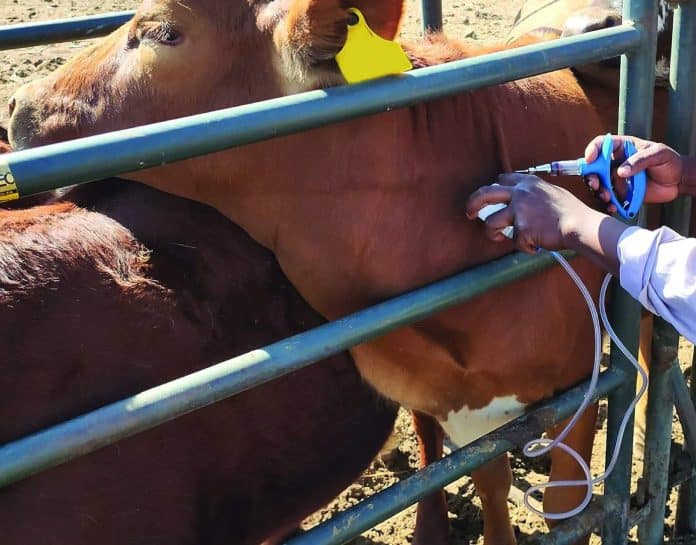Estimated reading time: 5 minutes
Lees hierdie persverklaring in Afrikaans.
A recent media article stating that the public could purchase foot-and-mouth disease (FMD) vaccines from Onderstepoort Biological Products (OBP) confused livestock producers. The National Red Meat Producer’s Organisation (RPO National) has taken the matter up with the relevant publication, who then issued a correction afterwards.
However, many producers were left confused and there were questions as to why it could not be done. Why can’t producers protect their animals, and thus businesses, from FMD by vaccinating their animals? The RPO wants to implore producers to always be aware of the facts regarding the regulatory steps that pertain to FMD vaccination.
FMD is a state-controlled disease
FMD is listed as a controlled animal disease under the Animal Diseases Act, 1984 (Act 35 of 1984). Other diseases included in this list of controlled diseases include brucellosis, anthrax, rabies, sheep scab, and approximately 33 other animal diseases. The list can be obtained from the National Animal Health Forum’s (NAHF) website at https://nahf.co.za/controlled-and-notifiable-diseases/.
A controlled and/or notifiable disease means that veterinarians, farmers, farm managers, animal owners, and laboratories are legally required to report a disease to authorities as soon as it, in this case FMD, is suspected on a farm or in an area. A disease reporting form is used for this purpose and can be obtained from the NAHF’s website.
Once reported, a state veterinarian must intervene and test for FMD while the necessary quarantine barriers are implemented. The World Organisation for Animal Health (WOAH) must also be informed of any suspected or confirmed outbreaks.
FMD vaccines and vaccinations
The FMD vaccines used by the National Department of Agriculture (NDA) are procured from the Botswana Vaccine Institute (BVI) according to the stipulated doses needed. The BVI has been hosting the World Animal Health Organisation’s regional reference laboratory for FMD since 1985. As OBP is not a manufacturer or distributor of FMD vaccines, this parastatal cannot sell these vaccines. Although it is possible for producers to purchase and administer vaccines for certain controlled animal diseases (for example brucellosis and anthrax) from vaccine manufacturers, it is essential to understand that it cannot be done for FMD.
In South Africa, vaccinations are only administered continuously (chronic) in the so-called buffer zone (basically an area surrounding the Kruger National Park). Outside of the buffer zone, vaccination is only administered on farms affected by outbreaks. Due to the devastating impact of FMD on dairy herds during the recent 2024 outbreak in the Eastern Cape, the Department of Agriculture deviated from the rule, stating that only affected farms can be vaccinated, allowing neighbouring dairy farms to also apply for vaccination.
Vaccination against FMD is the sole responsibility of the NDA. Only the department can decide when and where animals will be vaccinated against FMD; this state organ administers all FMD vaccines. Once the vaccines have been procured from BVI, they are distributed to the various state veterinarians in the affected areas for administration. Animals vaccinated against FMD must be branded with an ‘F’ on the neck to identify them as vaccinated. The state veterinarians will handle any leftover doses and communicate them to the government, who then decide where to use them.
Know the FMD status of your area
According to the latest update by the NDA (end of November 2024), there are still 38 open cases of outbreaks in the Eastern Cape, and 140 in KwaZulu-Natal, with none in the remainder of our provinces. Should any producer or livestock agent be unsure about the FMD status of your region, you can visit the NAHF’s website and navigate to https://nahf.co.za/update-report-foot-and-mouth-disease-outbreak-2022-2024/
FMD is quite a unique disease in terms of management, as infected animals and vaccinated animals are treated in the same way. This is due to the difficulty in determining whether the animals test positive due to antibodies from the active virus or the vaccine. Infected or vaccinated animals cannot just be moved, sold, or slaughtered; specific procedures must be followed if anything needs to be done. The procedure to move, slaughter, or introduce new animals to the herd is based on a timeframe, starting with Day Zero as the vaccination date, on condition that no new active virus is detected. This is why the vaccine is not available in the open market and cannot be administered as a precautionary measure by everyone.
Conclusion
While vaccinating animals against FMD is the state’s duty, it must be said that biosecurity is everyone’s duty, and it starts at the farm level. Contracting FMD on your farm is devastating. Your income is halted since you cannot move or sell your animals. Producers are once again implored to follow the rules when it comes to buying and transporting animals by insisting on health certificates and proof of said results, and if the government has declared a moratorium on the movement of livestock, not to transport animals in and from the designated zones.
The only way we can limit the spread and, thus, the impact of FMD in future is for every farmer to ensure that he/she does not purchase or sell infected animals and to apply the correct biosecurity rules and quarantine measures on the farm. –Press release, Red Meat Producers’ Organisation
For more information, contact Dr Frikkie Maré on 084 446 6787 or email frikkie@rpo.co.za or visit the websites and links supplied in this press release.


